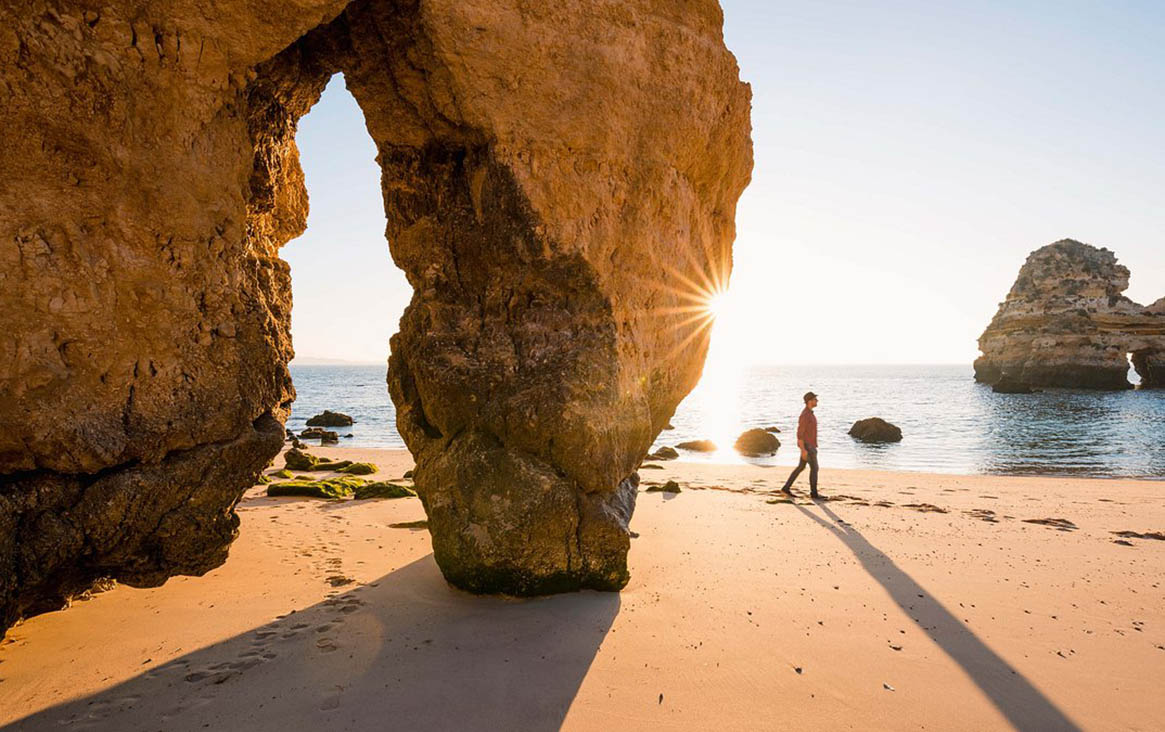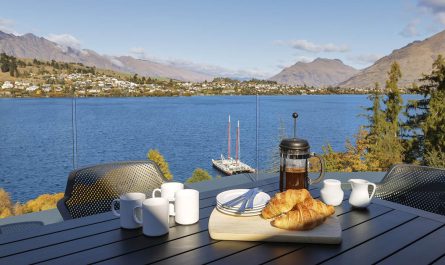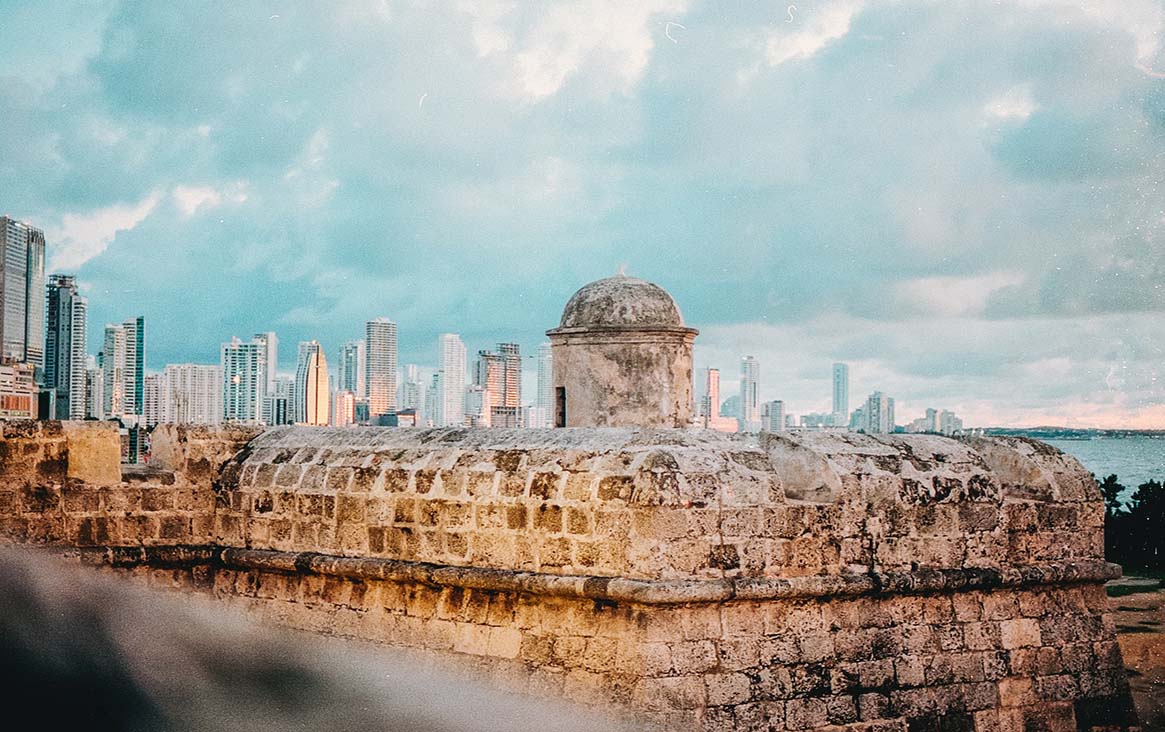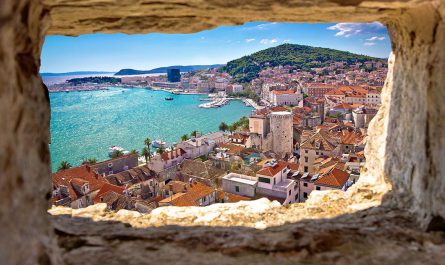The Algarve, located in southern Portugal, is renowned for its stunning coastline, charming beaches, and rich historical culture. I embarked on an adventure to explore every corner of the Algarve. I’ll share some practical tips for your road trip in the Algarve, aiming to make your journey as enjoyable and smooth as possible.
Best Time to Visit the Algarve
The Algarve, a stunning region in southern Portugal, is renowned for its sunny climate and beautiful landscapes. The weather plays a crucial role in planning a road trip here, and each season offers a unique experience. Here’s a more detailed look at the best times to visit the Algarve:
Summer (June to August)
Weather:
Summer in the Algarve is characterized by warm to hot temperatures, ranging from 20°C (68°F) to 30°C (86°F) or higher. The skies are mostly clear, and the sun shines brightly. Coastal areas often benefit from cooling sea breezes, but inland regions can become quite hot.
Highlights:
- Beach Weather: Summer is perfect for enjoying the Algarve’s beautiful beaches. The warm sea temperatures and long sunny days make it ideal for swimming, sunbathing, and water sports.
- Festivals and Events: The summer season is bustling with local festivals, cultural events, and outdoor concerts. This is the time to experience the vibrant atmosphere and participate in various local celebrations.
- Tourist Crowds: While summer offers great weather, it also attracts large numbers of tourists. Beaches, restaurants, and major attractions can be crowded, and prices for accommodation may be higher. Booking in advance is recommended.
Autumn (September to November)
Weather:
Autumn is another excellent time for a road trip in the Algarve. The weather remains pleasant, with temperatures cooling from the summer highs. September temperatures range from 22°C (72°F) to 28°C (82°F), gradually dropping to around 15°C (59°F) to 22°C (72°F) in November. The weather is still warm enough to enjoy the beaches, but with fewer crowds.
Highlights:
- Mild Temperatures: Autumn temperatures are comfortable, making it a great time for outdoor activities, sightseeing, and exploring without the intense heat of summer.
- Lower Tourist Volume: The crowds diminish after the summer peak, providing a more relaxed experience at popular sites and beaches.
- Harvest Season: Autumn is the time for local harvests. Enjoy fresh seasonal produce, such as figs, grapes, and olives, and visit local markets and festivals celebrating the harvest.
The Algarve is a year-round destination with each season offering distinct advantages. Spring and autumn are particularly favorable for a road trip due to the mild weather and lower crowds, while summer is ideal for beach enthusiasts and those who enjoy a lively atmosphere. Winter provides a peaceful retreat with off-season rates and a chance to experience local traditions. No matter when you visit, the Algarve’s beauty and charm are sure to make your road trip unforgettable.
How to Get to Faro, Algarve
Traveling to Faro, the gateway to the Algarve region, is a straightforward process, and several options are available to suit different preferences and budgets. Here’s a comprehensive guide on how to reach Faro, with details on transportation and booking tips to ensure a smooth arrival.
Flying to Faro
1. Major Airlines and Flights:
To get to Faro, the most convenient option is to fly into Faro Airport (Aeroporto de Faro), the primary airport serving the Algarve region. Faro Airport is well-connected with major European cities, and several airlines operate flights to this destination.
- TAP Air Portugal: I personally flew with TAP Air Portugal from Lisbon. The flight duration is approximately 1 hour and 15 minutes. TAP offers a comfortable and efficient service, making it a reliable choice.
- Ryanair: This low-cost airline operates numerous flights from various European cities, including London, Dublin, and Barcelona. Ryanair is a popular choice for budget travelers looking for affordable fares.
- EasyJet: Another budget airline, EasyJet, also provides flights to Faro from cities such as Berlin, Manchester, and Paris. EasyJet is known for its competitive pricing and frequent services.
2. Booking Tips:
- Advance Booking: To get the best deals, I recommend booking your flight well in advance. Prices tend to rise as the departure date approaches, so securing your ticket early can help you save money.
- Check for Discounts: Keep an eye out for promotions and discounts offered by airlines. Signing up for newsletters or following airlines on social media can provide notifications about special offers and sales.
- Flexible Dates: If your travel dates are flexible, use fare comparison tools to find the cheapest days to fly. Often, mid-week flights are less expensive than weekend options.
From Faro Airport to the City Center
1. Taxi Services:
Upon arrival at Faro Airport, you’ll find a dedicated taxi rank just outside the arrivals terminal. Taxis offer a convenient and direct way to reach your accommodation. The journey to Faro city center takes approximately 15-20 minutes and costs around €15 to €20, depending on traffic and the exact destination.
2. Bus Services:
For a more economical option, consider taking a bus from the airport. The local bus service, operated by the company EVA Transportes, provides regular routes connecting the airport to Faro city center. The journey takes about 30 minutes and costs approximately €2.50. Buses run frequently, but it’s a good idea to check the schedule in advance to ensure timely departures.
3. Car Rentals:
If you plan to explore the Algarve region beyond Faro, renting a car is an excellent option. Faro Airport hosts several car rental companies, including Hertz, Europcar, and Sixt. Renting a car allows you to enjoy the flexibility of traveling at your own pace and accessing more remote destinations in the Algarve.
- Booking in Advance: To get the best rates, book your rental car online before your trip. Compare prices across different rental agencies and consider options for pre-paying to secure the lowest price.
- Pick-Up Location: The car rental desks are located in the arrivals area of the airport. After completing the paperwork, you can pick up your vehicle and begin your journey.
4. Shuttle Services:
Some hotels and resorts in Faro offer shuttle services to and from the airport. Check with your accommodation to see if this service is available. It’s a convenient option if you prefer not to navigate public transportation or if you’re carrying a lot of luggage.
Transportation Tips
1. Currency and Payment:
When using taxis or paying for other transportation services, keep some local currency (Euros) handy. While credit cards are widely accepted, having cash can be useful for small transactions or tips.
2. Language:
English is commonly spoken in the Algarve, especially in tourist areas. However, learning a few basic Portuguese phrases can enhance your experience and help you interact with locals more comfortably.
3. Travel Insurance:
Consider purchasing travel insurance before your trip. Insurance can provide coverage for unexpected events, such as flight delays or lost luggage, and give you peace of mind during your travels.
4. Local Transportation:
Once in Faro, you’ll find that the city is well-served by local buses and taxis. Faro is also quite walkable, so exploring the city center on foot is a pleasant option.
Reaching Faro is relatively straightforward, with multiple flight options available from major cities across Europe. Once you arrive, various transportation choices, including taxis, buses, and car rentals, ensure that you can easily get to your accommodation and start your adventure in the Algarve. By planning ahead and considering your travel preferences, you can make your journey to Faro as smooth and enjoyable as possible.
How to Explore the Algarve
The Algarve is perfect for a road trip with its scenic coastline and charming towns. Here’s how I explored the region:
1. Renting a Car
Renting a car is the most convenient way to explore the Algarve. It gives you the flexibility to plan your route and visit attractions at your own pace. I rented a car from Faro Airport through major platforms like Rentalcars or Europcar. Car rental prices vary depending on the vehicle type and rental duration, typically ranging from €30 to €70 per day.
2. Public Transportation
If driving isn’t your preference, public transportation is a viable option. The Algarve has a well-developed bus network, with services like Rede Expressos and Eva Transportes connecting major cities and towns. For local travel within towns, buses and taxis are available, though these options can be slower and require careful planning.
3. Biking and Walking
For a slower-paced exploration, biking and walking are great ways to see the Algarve. Many towns and coastal areas have bike paths and walking trails. In places like Lagos and Albufeira, renting a bike and cycling along the coast offers beautiful views and a relaxing experience. Walking is also enjoyable, especially in picturesque old towns and along scenic beaches.
My Algarve Road Trip Experience
During my road trip in the Algarve, I was captivated by the natural beauty and rich cultural heritage of the region. Here are some tips that I found helpful:
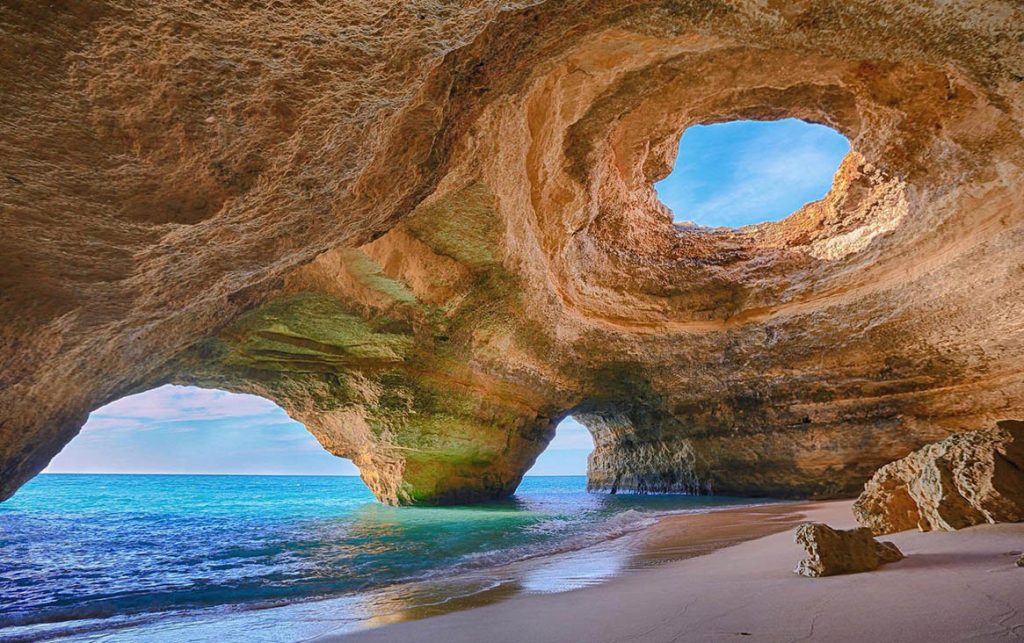
1. Plan Your Itinerary in Advance
While road trips offer freedom, having a rough itinerary helps make the most of your time. I suggest mapping out key destinations and attractions, allowing some flexibility for spontaneous exploration.
2. Ensure Car Rental Safety
Before renting a car, check the vehicle’s condition and insurance coverage. Make sure the brakes, tires, and fuel level are all in good order to ensure a safe journey. The Algarve’s scenic routes, with winding roads and coastal views, require attentive driving.
3. Try Local Cuisine
The Algarve boasts a diverse culinary scene. Don’t miss local specialties like seafood rice (Paella) and grilled sardines (Sardinhas Assadas). Many charming restaurants and seafood markets in the towns offer fresh, authentic dishes. Enjoying the local cuisine is a delightful part of the trip.
4. Discover Local Culture
Beyond its beautiful beaches, the Algarve has a wealth of historical and cultural sites. The ancient castle in Silves and Roman ruins in Ferragudo are must-sees. Additionally, traditional festivals and local crafts add a unique cultural flavor to the region.
My road trip through the Algarve was a journey filled with breathtaking landscapes, cultural experiences, and delicious food. I hope these tips help you plan your own adventure and make the most of your time in this enchanting region. Enjoy every moment of your Algarve road trip!
